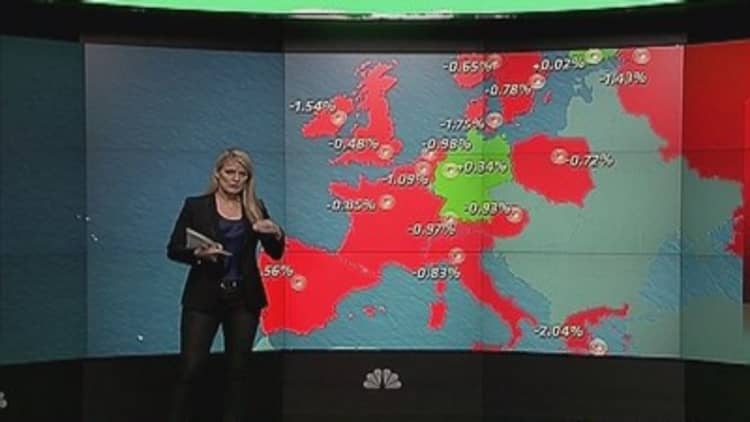
European shares closed lower on Friday after another volatile week dominated by events in Ukraine, with a referendum this weekend in Crimea. The week also saw lingering investor concerns over China's economic outlook.
Crimea referendum nears
The pan-European FTSEurofirst 300 Index tipped into the red once more on Friday, provisionally closing down 0.7 percent at 1,284.20 points, with all major bourses and sectors posting losses for the week. The benchmark saw its second consecutive weekly drop and the worst percentage loss seen since late January.
Britain's FTSE 100 hit a five-week low on Friday, with its biggest weekly drop in eight months. The blue-chip closed provisionally down 0.5 percent on the day, taking the week's total losses to 2.8 percent, the biggest decline since June last year.
The German DAX outperformed its European peers on Friday and closed higher by around 0.3 percent, after German inflation data met expectations. Consumer prices showed a month-on-month rise of 0.5 percent and a year-on-year rise of 1.2 percent for February.
However, the German index was down for the week by 3.2 percent, while the French CAC 40 closed down 3.6 percent for the week.
Ukraine vote looms
Tensions around Ukraine dominated markets, as diplomatic efforts generated plenty of headlines ahead of Sunday's referendum. Global equity markets have been falling from multi-year highs since the Ukraine crisis began late last month.
The looming vote in Crimea saw Russian markets continue to slide on Friday, as Goldman Sachs reported that capital outflows from the country had hit $45 billion since the start of the year.
Russia's MICEX index closed around 1 percent lower on Friday. The biggest losers included steel company Severstal, down 4.96 percent, and airline Aeroflot, which fell 10.44 percent.
(Read more: Russia stocks hit 4½-year low, outflows surge)
Gold traded at a six-month high on Friday, as investors seeking shelter from global concerns surged into the yellow metal.
U.S. stocks fluctuated on Friday, after the market's worst session since early February on Thursday. After a four-day slide, the Dow Jones Industrial Average traded in a 105-point range on either side of neutral, rising 33.33 points, or 0.2 percent.
A U.S. preliminary report from Thomson Reuters/University of Michigan had consumer sentiment at 79.9 in March versus an 82 estimate.
In Asia on Friday, Japan's' Nikkei slid 3.3 percent and fell by more than 500 points, witnessing its worst week since August.
Arseniy Yatsenyuk, Ukraine's interim prime minister, spoke in front of the United Nations on Thursday urging Russia for negotiations to end the standoff. Meanwhile, German Chancellor Angela Merkel warned of a "catastrophe" if Russia does not drop its plans to annex Crimea.
(Read more: Ukraine PM: Crimea vote is a foregone conclusion)
U.S. Secretary of State John Kerry said if Russia goes through with the referendum in Crimea on Sunday, the U.S. and the West will respond with a "serious series of steps." Russia, meanwhile, was carrying out military exercises near the Ukraine border.
Kerry and Russian Foreign Minister Sergei Lavrov met in London Friday. Kerry said in a press conference that Lavrov had said that Russian President Vladmir Putin would not make his mind up on Crimea until after Sunday's vote, while Kerry reiterated that there would be consequences if the vote takes place.
"One thing is for sure, traders would be foolish to make the mistake they made two weeks ago and go home long into the weekend, particularly with the situation on the ground in Ukraine so potentially fluid, and the Crimea referendum vote due on Sunday," Michael Hewson, a chief market analyst at CMC Markets said in a morning note.
On Sunday, a succession referendum is set to be held in the Ukrainian republic of Crimea. The vote provides a choice between two options. One is joining the Russian Federation, and the other is having greater autonomy from Ukraine as outlined by the 1992 Crimean constitution. There is no third option to maintain the status quo.
(Read more: Crimea referendum: Why it's so important)
European markets
As well as tensions in the eastern European country, the Chinese growth story continued to weigh on global stocks. The world's second-largest economy released weaker-than-expected February retail sales and industrial output figures on Thursday, fueling worries about the health of China's economy. There was also news of China's central bank halting certain types of mobile payments, which pulled down online payment related companies. Mainland shares put up a sluggish performance on Friday, closing lower by around 1 percent.
(Read more: Is China's slowdown actually good for the world?)
Vivendi in talks
On Friday, French media and telecommunication company said it would enter talks to sell its SFR telecom unit to Altice, the parent company of . Numericable shares closed higher by 11 percent on the news.
SFR is France's second-biggest telecom operator, and sales talks are set to last three weeks. Numericable's offer included 11.75 billion euros ($16.36 billion) in cash and a 32 percent share in the combined listed entity.
Meanwhile, , which announced a bid for SFR on Thursday, saw its shares slump 3 percent.
Shares of French industrial company provisionally closed down 2.9 percent after Berenberg cuts its outlook on the firm to a "sell" from a "hold".
Finnish retail group also saw selling after reporting that sales fell 2.5 percent in February; shares closed down 3 percent on Friday.
Follow us on Twitter: @CNBCWorld


